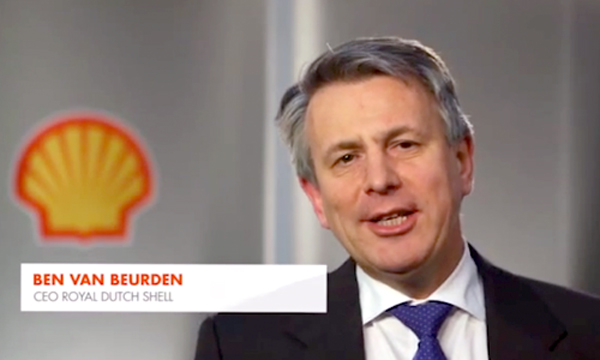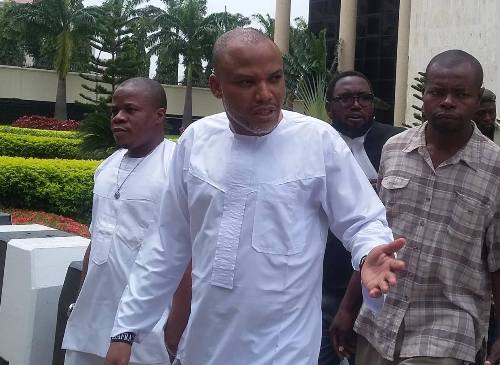$1.3b Malabu scandal: Shell’s global CEO exposed

Documents leaked to Finance Uncovered on the Malabu Oil deal, revealed that the international Chief Executive Officer (CEO) of Shell, Ben van Beurden, was placed under secret surveillance as part of a pan-European corruption investigation into the way the firm paid $1.3 billion for Nigeria’s oil bloc OPL 245.
The leaked information included a recording of a wiretapped telephone conversation between Shell’s Van Beurden, and his then chief financial officer, Simon Henry, after a raid by Dutch financial police on the corporation’s headquarters in The Hague.
In the 14-minute tape, van Beurden was heard discussing the raid earlier that day in which thousands of documents relating to a deal it struck in Nigeria were seized – a deal currently being investigated over allegations that $1.3 billion was wired to former Nigerian Minister of Petroleum, Dan Etete.
Beurden was heard on the intercept warning Henry not to volunteer any information that is not requested if approached by the police and discussing the ramifications for the company’s share price.
In one extraordinary passage, he said “loose…pub talk” by two former MI6 operatives the company had employed to gather intelligence in Nigeria ¬– and who had speculated which politicians might get “payoffs” if Shell secured the deal.
The conversation was said to have taken place in February last year when Dutch authorities raided Shell’s HQ after a request from counterparts in Italy.
Italy and the Netherlands are presently investigating the $1.3 billion purchase of the OPL 245 by Shell and Italian oil major Eni in 2011.
The scandal was on allegations that Shell and ENI knowingly paid $1.1-billion to former Nigerian petroleum minister, Dan Etete for OPL 245, a concession he had improperly awarded to himself while in office.
Most of the money allegedly flowed as kickbacks to Nigerian government ministers and ENI executives.
The intercept is understood to form part of the Italian prosecutor’s case against Shell, which is now being prosecuted together with ENI in Milan. The Economic and Financial Crimes Commission (EFCC) is pursuing a separate prosecution in Abuja against Shell, ENI and others.
As part of the Italian legal process, the evidence that the prosecutor intends to use has been shared with the implicated parties ahead of a court hearing on April 20 to confirm the charges.
Shell and ENI have since denied any wrongdoing, and there is no suggestion that Van Beurden, who only became CEO in 2014, played any part in the deal. Both companies insist they have cooperated fully with the authorities.
The evening of the raid, February 17, Van Beurden phoned chief financial officer, Simon Henry, to discuss what police might have discovered, and how Shell could limit the fall-out.
At the outset of the conversation, he told Henry he is stepping out of the room so he can’t be overheard by the family nanny – unaware of the police eavesdroppers and a far wider audience.
They then discussed the raid and which of their offices had been examined.
Van Beurden then referred to an ongoing internal investigation led by Shell’s own legal chief.
When Henry asked for an update on that, the CEO replies: “I don’t think they have found anything that was clearly incriminating or that sort of suggested that we were colluding or doing anything inappropriate.”
He adds: “But there was apparently some loose chatter between people from the [OPL 245] team, particularly the people that we hired from MI6 whoever, must have said things like, “Well, yeah, you know, I wonder who gets a pay-off here and whatever”, so it’s unhelpful email exchanges. It’s, it’s … I haven’t seen them but apparently they were judged to be, you know, just pub talk in emails which was stupid. But nevertheless it’s there.”
According to Finance Uncovered, the newspaper believed Guy Colegate and John Coplestone, who worked for Shell as “senior business adviser” and “strategic investment adviser” respectively.
According to documents seen by Finance Uncovered, they had been instrumental in gathering the intelligence that helped Shell to acquire the much-prized oil block, OPL 245, a field that increased Shell’s proven oil reserves by a third.
In the wiretap, Messrs. Van Beurden and Henry then agreed about the need to inform the UK Serious Fraud Office and the US Department of Justice about the raid, especially because the OPL 245 deal “happened at a time we were of course under deferred prosecution agreement, so, we should have maybe at the time been a more open with the DoJ [US Department of Justice] than we now find we have been.”
With all eyes on Shell’s share price following the BG Group merger, both men expressed their reluctance to disclose all but the most limited information to shareholders via the US Securities and Exchange Commission.
“The last thing you want of course is some sort of request to issue a stock exchange release when there is nothing to be said other than we are being asked to provide information”, van Beurden added.
Finally, Van Beurden rang off with a friendly reminder to Mr. Henry, who planned to go in to the office the following morning despite the ongoing police operation: “You probably … know this, [but] don’t volunteer any information that is not requested.”
In response to questions posed to Shell, Messrs van Beurden and Henry, a spokesperson said: “Given this matter is currently under investigation, it would be inappropriate to comment on specifics. However, based on our review of the Prosecutor of Milan’s file and all of the information and facts available to Shell, we do not believe that there is a basis to prosecute Shell. Furthermore, we are not aware of any evidence to support a case against any former or current Shell employee. If the evidence ultimately proves that improper payments were made by Malabu or others to then current government officials in exchange for improper conduct relating to the 2011 settlement of the long-standing legal disputes, it is Shell’s position that none of those payments were made with its knowledge, authorization or on its behalf.
“We are taking this matter seriously and are fully co-operating with the relevant authorities. This includes when appropriate having shared the key findings of an investigation led by Debevoise & Plimpton LLP, an independent international law firm. We have also accurately reported on the OPL 245 settlement in our annual reports.
“Shell attaches the greatest importance to business integrity. It’s one of our core values and is a central tenet of the Business Principles that govern the way we do business.”
He added: “We notified the US and UK authorities of the visit to Shell’s office by the Dutch Prosecutor, and we subsequently shared with them the findings of our internal investigation.”
Finance Uncovered said it believed that the “loose chatter” and “just pub talk” mentioned by Shell CEO Ben van Beurden in his wiretapped phone conversation referred to emails sent and received by John Copleston and Guy Colgate.
The pair have been described by the public prosecutor in Milan as former MI6 officers employed by Shell. They were key figures in Shell’s attempt to secure the OPL 245 rights from Dan Etete and Malabu.
From October 2009 onwards, they met with Etete or his advisers and fed intelligence back to senior Shell managers.
In Shell internal documents seen by Finance Uncovered, the duo told their superiors that money was likely to flow to President Goodluck Jonathan and other powerful figures. This intelligence also made its way into briefings supplied to Shell’s top executives.
After Jonathan became acting president of Nigeria, Colegate emailed a senior Shell executive in The Hague on March 9 2010 to brief him on a meeting he had just had with a source in Paris. He said Etete “can smell the money” and that “others in the mix might not let him” walk away from a deal at this stage. The following day, Colegate’s email was forwarded to then-Shell CEO Peter Voser.
On July 15 2010, Colegate was said to have had a long meeting with a source in Paris, and then briefed Copleston and Peter Robinson, Shell’s then vice-president for Commercial in Africa.
According to the email, the source, seemingly an Etete intermediary, claimed President Jonathan had confirmed Etete’s right to the oil block.
Copleston then wrote that this move is “clearly an attempt to deliver significant revenues to GEJ (Goodluck Jonathan) as part of any transaction”.
He added that “the clear driver is to get cash into the system ASAP”, and that, for Jonathan and his oil minister, “this is about personal gain and politics”.
On August 23 2010, Robinson reportedly prepared briefing notes for his boss, Shell then head of exploration Malcolm Brinded, ahead of his meeting with his ENI counterpart.
The briefing note, informed by his intelligence on the ground, said: “In country view [from Nigeria] is that the President is motivated to see 245 closed quickly – driven by expectations about the proceeds that Malabu will receive and political contributions that will flow as a consequence – reinforces need for a solution quickly.”
In another briefing document written in the late stages of the negotiations, Brinded was said to have briefed Simon Henry and Voser about the transaction structure to say: “Eni will pay on behalf of itself and SNEPCo [a Shell subsidiary], an amount of $1.09bln. This will be used by the FGN [Federal Government of Nigeria] to settle all claims from Malabu.”
Shell, ENI, and former President, Jonathan denied any wrongdoing.
Simon Taylor, director of campaign group Global Witness, which has spent several years investigating the deal, said: “This is one of the worst corruption scandals the oil industry has ever seen. Today’s new evidence shows senior executives at the world’s fifth biggest company knowingly entered into a corrupt deal with that deprived the Nigerian people of $1.1billion. To put that in context, the deal is worth more than Nigeria’s entire health budget for 2016.”








